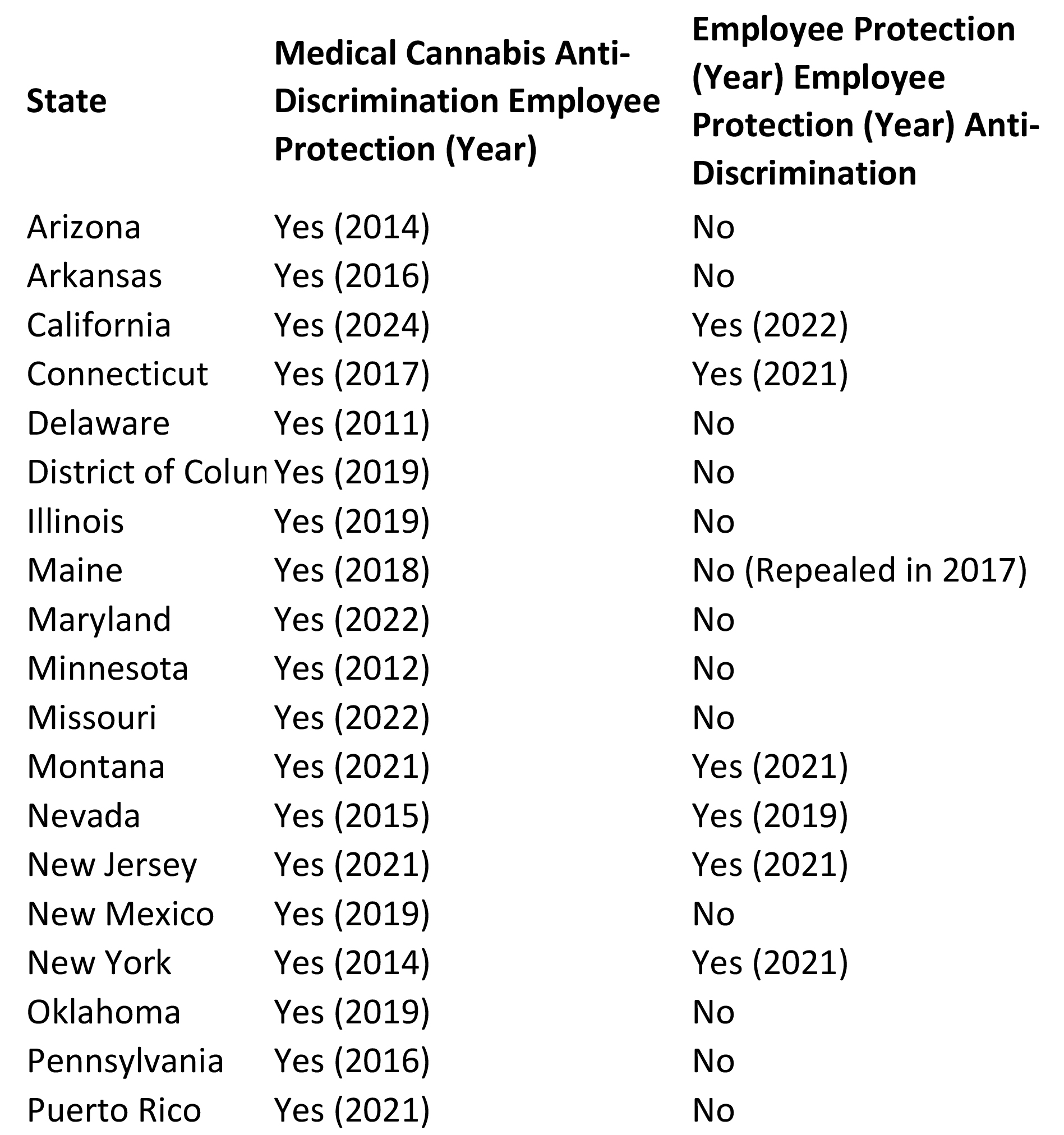Lately, many HR professionals face a similar challenge — adjusting the company policy to fit the latest regulations regarding cannabis use.
If you also struggle with navigating the complexities of medical cannabis in the workplace, you came to the right place.
This article provides the information and guidance you need to fulfill your obligations towards employees using medical marijuana.
With the majority of states allowing cannabis use and the growing popularity of CBD shops like Secret Nature CBD, understanding your legal obligations is crucial.
Below, we explore recent court decisions, employment protections, drug-testing practices, and workplace safety considerations.
Stay informed and ensure compliance in this ever-evolving landscape of medical marijuana laws.
Key Takeaways
- Employers must examine their policies to ensure compliance with state disability accommodation and leave laws, as well as the Americans with Disabilities Act (ADA) and the Family and Medical Leave Act (FMLA).
- Early cases held that employers do not need to accommodate cannabis treatment. Yet, recent cases have reached different conclusions, with some state courts ruling in favor of employees seeking accommodation for medical cannabis use.
- A growing number of states are including employment protections in their marijuana legalization statutes, prohibiting discrimination against off-duty cannabis use or requiring accommodation for medical reasons.
- Employers have obligations regarding the use of medical marijuana in the workplace, including ensuring the safety of employees and others, complying with anti-smoking laws, and considering the limitations resulting from marijuana use in safety-sensitive tasks.
Legal Considerations for Medical Cannabis Accommodations
Legal considerations around medical cannabis accommodations are a hot topic for HR professionals.
Most states allow medical marijuana use. But federal law sometimes doesn’t agree with state laws when it comes to jobs.
As a result, HR folks need to check their company policies. They need to ensure they follow state laws about disability accommodations and leaves.
Currently, medical cannabis is legal in 38 states, with seven of them providing recreational cannabis anti-discrimination employee protection.

Employers have a duty to keep the workplace safe for everyone. Therefore, they must consider whether allowing medical cannabis use will affect safety.
Take safety-sensitive or federally regulated positions, for example. There might be some exceptions for medical marijuana use in these roles.
Next, we have disability protections and reasonable accommodations.
Under the Americans with Disabilities Act (ADA) and similar state laws, employers must talk to workers with disabilities to figure out reasonable accommodations for them.
Still, some recent court decisions favor employers. In Johnson v. Columbia Falls Aluminum Co., the Montana Supreme Court ruled that an employer need not accommodate medical marijuana use.
HR professionals need to understand state and federal laws. Some states protect jobs in their marijuana legalization laws. But, there can be differences between state and federal laws.
It’s key for HR people to know the specific laws in their area and follow them.
Employer Obligations and Employee Rights
Understanding the obligations and responsibilities tied to medical cannabis accommodations is usually a balancing act between fulfilling legal requirements and safeguarding employee rights.
Factors such as reasonable adjustments, disability rights, workplace safety, and employee privacy all come into play.
As mentioned before, the Americans with Disabilities Act (ADA) mandates that employers engage in dialogue with disabled employees. This is to determine what reasonable accommodations can be made.
For instance, if a worker has a disability that requires medical cannabis treatment, the employer might have to adjust certain aspects of their work environment.
However, it’s worth noting that employers aren’t required to allow on-duty consumption or any use that could endanger the workplace.
Workplace safety is a major concern for employers. When an employee’s medical cannabis use potentially puts them or others at risk, employers may have the right to limit or even ban its use. This is especially true in roles that are safety-sensitive or governed by federal laws.
Privacy is another crucial aspect. Even as employers enforce policies and aim for productivity, they must respect employees’ privacy using medical cannabis within the bounds of state law. It includes treating employee information and medical records confidentially and only sharing details when necessary.
Keeping up with the changing landscape of medical marijuana laws and regulations is critical to being legally compliant.
With a firm grasp of these obligations and responsibilities, HR professionals can smoothly handle the intricacies of medical cannabis accommodations.
Impact of Medical Cannabis on Workplace Performance
Medical cannabis can significantly influence employee performance in the workplace. Employers must keep in mind the potential impact on productivity, safety issues, performance assessment, employee awareness, and regulations regarding medical cannabis use at the workplace.
Productivity can be affected by an employee’s use of medical cannabis. Regular consumption of marijuana can potentially impair concentration, attention, and memory. Therefore, employers must take into account limitations due to marijuana use before assigning tasks requiring a high level of awareness.
This rule applies even if the employee doesn’t consume marijuana at work or feels any impairment. Safety-sensitive tasks shouldn’t risk the safety of the employee or their colleagues.
Speaking of which, safety is another critical factor. Employers should ensure that any rules against marijuana use don’t discriminate against those with disabilities.
Both employees and employers have specific responsibilities regarding medical cannabis use.
Employees aren’t allowed to jeopardize their own safety or that of others. Smoking marijuana at work is banned under anti-smoking laws, and employees can’t be absent without valid reasons or be impaired at work.
Performance evaluation plays a crucial role in understanding the effect of medical cannabis on workplace performance.
Employers should have well-defined policies on marijuana use at work and off-duty consumption. They should specify what constitutes reasonable suspicion of intoxication.
Performance evaluations should accommodate any limitations due to medical cannabis use.
Education for employees is vital to maintain a safe and productive work environment. Employers should offer information and resources on the effects of medical cannabis and its possible impact on job performance. Doing so will help employees make informed decisions and understand their responsibilities.
Finally, clear workplace policies addressing medical cannabis use are essential. Employers should have specific rules concerning marijuana use at work based on health and safety considerations or other relevant workplace factors.
These policies should be implemented in good faith and without any discriminatory intent.
Tips for Developing Effective Company Drug Policies
Before recruiting new staff, Human Resources (HR) personnel need to consider a few factors.
The most important considerations include:
- pre-employment screening
- establishing rules regarding the use of medical marijuana at work that are compliant with current regulations
- developing rules regarding off-duty consumption of cannabis that take into account state laws and regulations
Here’s a simple guide on how to create effective drug policies in your company.
Firstly, pre-employment screening is crucial. The aim is to maintain a safe and drug-free working environment.
Pre-employment drug testing should be in alignment with state laws and regulations. This includes any specificities related to testing for marijuana.
Next, developing a comprehensive drug policy is vital. It should clearly outline the company’s position on drug use, including medical marijuana.
The policy should address various areas. These include workplace safety issues, employee privacy rights, and compliance with drug testing regulations.
Additionally, policies should be in place to prevent marijuana usage and impairment while on duty. Employees should be aware of the possible impacts of chronic marijuana usage on their performance. They should understand the importance of adhering to safety-sensitive tasks.
The Bottom Line
As an HR professional, it’s essential to understand the legal obligations and potential impact of medical cannabis use in the workplace.
By staying informed and developing effective policies, you can navigate the complexities of accommodating medical marijuana while ensuring compliance with evolving laws.
Prioritizing employee health and rights while considering workplace performance and safety is crucial. With the right knowledge and guidance, you can make informed decisions and fulfill your obligations towards employees using medical cannabis.
Frequently Asked Questions
How Can Employers Determine if an Employee’s Medical Marijuana Use Is Connected to Their Disability?
To determine if an employee’s medical marijuana use is connected to their disability, employers can establish a monitoring system to detect impairment in the workplace.
However, this approach presents challenges as cannabis can linger in the system even after 30 days of non-use, making drug testing an unreliable indicator of active impairment from cannabis.
Employers must also consider state privacy laws. It’s important to assess liability and provide reasonable accommodation.
What Are the Potential Consequences for Employees Who Use Medical Marijuana in the Workplace in Violation of Anti-Smoking Laws?
If you use medical marijuana in the workplace in violation of anti-smoking laws, you may face consequences like disciplinary action, termination, or legal repercussions. The repercussions you may face can differ depending on your employer’s policies and local regulations.
Can Employers Require Drug Testing for Marijuana as Part of Pre-Employment Screening in States Where It Is Legal for Medicinal Use?
In general, US employers are allowed to use preventative measures and require negative drug test results of their applicants.
That said, pre-employment drug testing laws vary by state. Some states have restrictions on pre-employment drug screening, while others require advance notice to an applicant after an employment offer.













